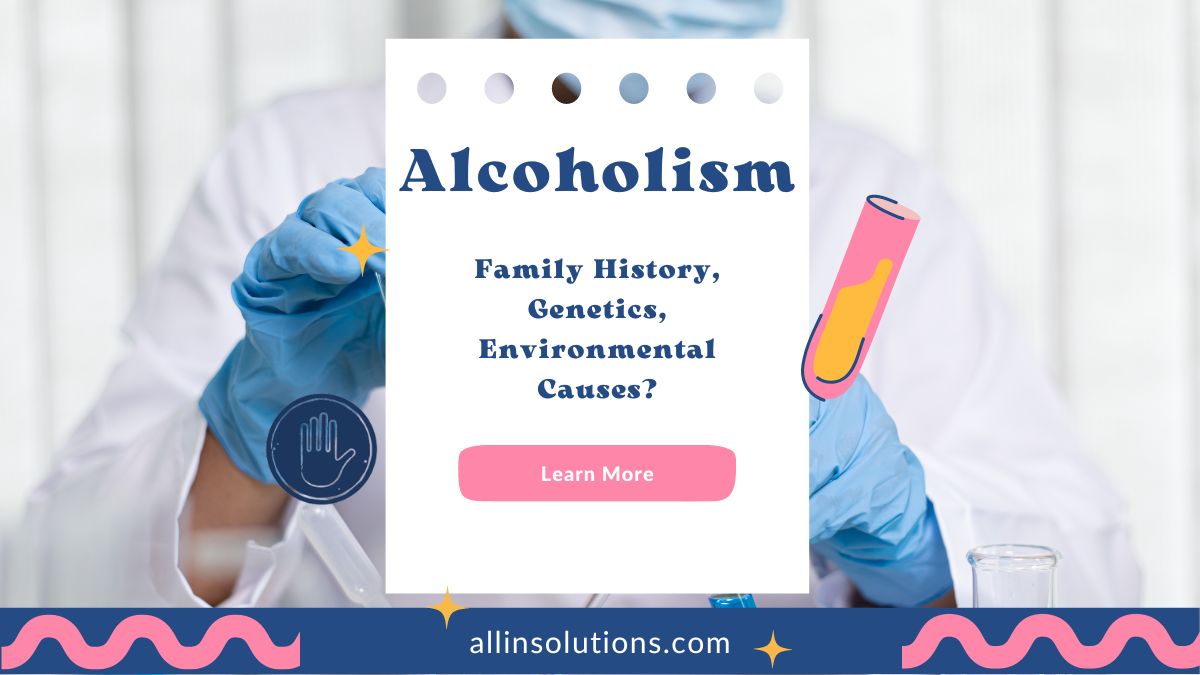Alcoholism (more formally known as alcohol use disorder) is a disease that affects millions across the country. Some of those who struggle with alcohol addiction have a family history of similar problems, while others do not. Similarly, many who have parents or other family members with an alcohol problem seem to have normal and healthy drinking patterns. So if both of these things are true, is there any credibility to the claim that alcoholism can be inherited?
As it turns out, there is a genetic component to alcoholism. But, while biological heritability and family history may seem interchangeable, it is important to note that there is a difference. Those with a “family history” of alcohol use disorder are likely both genetically predisposed to addiction, and also grew up in an environment that could play a role in developing a substance use disorder.
So what causes alcoholism exactly? This is a difficult question, but it’s one that deserves attention. The following article will attempt to provide some information that is helpful in arriving at an answer.
What causes alcoholism?
Before we get into the causes of alcoholism, let’s first define what it is. More accurately called alcohol use disorder, it’s “a medical condition characterized by an impaired ability to stop or control alcohol use despite adverse…consequences.”2 It is a medical condition, a brain disorder. It can be treated and managed in the same way as other medical conditions.
Can Alcoholism be Inherited
What is the cause of AUD? Why does AUD seem to be so common in some people and not others? It is not clear what causes AUD.
There are certain elements that can help to develop AUD:
-
What age were you when you began drinking?
Your risk of developing AUD can be affected by the age you began drinking. Higher risk is associated with younger people. The highest risk of AUD is to start drinking, especially heavy, as an adolescent (12-17 years old) or as a young adult (18-late 20s).
-
Stress levels and other environmental factors
Alcohol is commonly used to deal with stressful situations. This is the main external factor that influences AUD. One person’s definition of stress may be different from another. AUD can be caused by regular use of alcohol to manage stress. Your alcohol consumption will increase if you are dealing with chronic stress from work, relationships or other sources. You are at greater risk for AUD if you rely on alcohol to cope.
-
Mental health conditions
Alcohol is often used to manage stressful situations. It is also a common coping strategy against mental health conditions such as anxiety, depression and post-traumatic stress disorder (PTSD).
Some people have a genetic component to their mental illness. Even if there are no alcohol-related family history, it is possible that AUD can be caused by a genetic component of mental disorders. Although alcohol may temporarily help with anxiety or depression, it can actually make the problem worse.
-
Genetics
Although there is no single gene that causes alcohol abuse disorder, genetics and family history can have an impact on your risk. Genetics can affect your alcohol tolerance, alcohol metabolism, and vulnerability to various elements.
What makes alcoholism genetic?
You may be more likely to develop alcohol abuse disorder if you have a genetic component. It’s more than one gene. How is alcoholism genetic? The physical and mental effects of addiction to alcohol or other drugs are affected by genetics.
Some people inherit a low tolerance to alcohol. They can consume a lot of alcohol without it affecting their health as much as others. This tolerance is not good for you in order to prevent AUD. It can actually make it worse by making you drink more. Due to the excess alcohol required to achieve the desired response, it can also lead to additional health problems in the brain and liver.
Other genes can also influence how alcohol is metabolized in your body. A 36% proportion of East Asian people (Chinese, Japanese and Korean) has a variant in their DNA that alters the production of a particular liver enzyme. This can lead to unpleasant side effects when you drink. Although it might be a deterrent for some, light drinkers who have this genetic expression could be at greater risk of developing esophageal and other health problems.
Your brain’s hormone balance can have a significant impact on your emotional and mental response to alcohol. Other traits such as impulsivity and anxiety are also genetic. Genetic components can also be found in mental health conditions like depression and anxiety. There is most certainly a link between mental health, AUD.
Alcohol Dependence: Heritability Assessment
What is the heritability for alcohol addiction? It is estimated that between 50-60% of alcohol abuse disorder risk is genetically determined.5 This estimate applies to both men and women. Your genetic makeup does not mean that you will have AUD, even if it is in your family. It does not mean that you are immune to AUD if it is not in your family.
It is actually a component or a factor that can increase your chances of developing an addiction to alcohol. There still arestill behavioral and environmental components. Your risk of developing AUD if you are a victim of trauma or have used alcohol to cope. Genetics can make you more susceptible to AUD if you started drinking alcohol young and have a history of heavy drinking. This is also true for alcohol used to manage stress.
Even if alcohol abuse was a common part of your family’s history, it can still be a factor in your risk of developing AUD. It can still influence your risk of developing AUD.
Get treatment today
There is always hope for brighter and more sober futures. You have the option to fight AUD by taking a proactive approach. You don’t have the obligation to quit if you don’t drink your first drink. Your genetics are not your destiny.
Counselling, medication, therapy and other programs can be sought to manage stress, anxiety and trauma. You can also seek out healthy coping skills. You can also seek treatment for your AUD (or any other substance use disorder (SUD). You have control over your treatment for drug or alcohol detox.
All In Solutions Counseling Center is a network of drug and alcohol treatment providers. We offer outpatient and inpatient addiction treatment programs that are tailored to meet each client’s needs. Our specialized programs include:
- Christian recovery
- Medication-assisted addiction treatment
- Art addiction therapy
- Men’s rehab
- Women’s addiction treatment
Our locations include:
Did you miss our previous article…
https://www.allinsolutions.com/pete-davidson-opens-up-about-bpd-and-marijuana/





